北师大版英语高中必修二教案
高中英语必修二全套教案(北师大版)(完整资料).doc
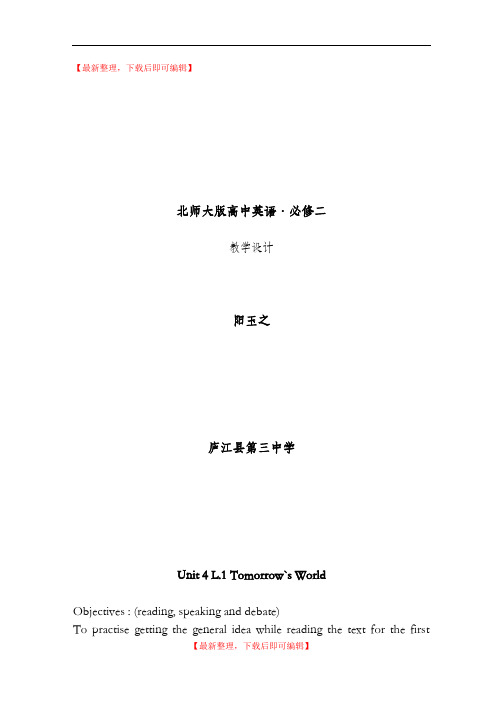
【最新整理,下载后即可编辑】北师大版高中英语·必修二教学设计阳玉之庐江县第三中学Unit 4 L.1 Tomorrow`s WorldObjectives : (reading, speaking and debate)To practise getting the general idea while reading the text for the firsttime.To use the title of a text to predict the content.To develop strategies to match topics with paragraphs.To identify important words in a text.To debate on students` opinions of cyberspace. ( optimistic or pessimistic)To write an article about their opinions of cyberspace.ReadingStep 1 Warm-upAs a class, students answer the question "Compared to 10 years ago, how do you think the technology has changed our lives?"The teacher will give the example first to start students` thinking, e.g.Ten years ago our cellphones were big and only for calls but now they become smaller and multi-functional.Students would surely mention the computer. And the teacher then guides the students to the topic : The Future of Cyberspace.Step 2 PredictionAsk students how useful it is to read the title of a text or a newspaper headline. In pairs , students discuss which topic will be mentioned in this text. Ask students if they would be mentioned any other topics if they were writing the article.Step 3 Extensive reading and getting the general idea.Match topics with paragraphsStudents read the text on the screen quickly and check their guesses. ( the time limit on the screen can train students` ability of fast reading and getting key words)Answers: the Internet virtual realityAt the same time students match topics with paragraphs.( exercises will be presented in the material.)Step 4 Words GuessingIn order to train students` ability of guessing meanings of newwords, the teacher will ask students to read out the sentences in the text containing the key words and then substitute the definition in the sentence. ( more practice will be done in the homework paper.)Step 5 Intensive ReadingStudents read the text again, finding the details of optimistic opinions and pessimistic opinions.Step 6 DebateStudents debate on Cyberspace, using all information they have learnt before.Step 7 Homework and AssessmentStudents will write an article about their opinions of cyberspace. The teacher will evaluate what students have got from the class and students are requested to do a self-assessment.1.Multiple choices.(1).Match the paragraphs with these headings in one minute. (general ideas)A) Pessimistic opinionsB) Seeing the futureC) Optimistic opinionsD) The Internet growth(2).Read the text again and choose the best topic sentence for the passage. (main idea)A) The Internet is good for us.B) The pessimistic opinions about the cyberspaceC) The opinions about the Internet.D) How are the computer and the Net going to affect our lives.(3).According to Peter Anderson, where will we live in the future? (detail information)A) outer spaceB) virtual worldC) virtual houseD) Internet world2. Guess the definitions of the underlined words.(1).Some experts are pessimistic about the Future. One worry is crime in cyberspace.(2).Even now, young hackers can get into the computer of banks and governments.3. SummaryThe article talks about _____________.Different people have different ideas. Someare__________. They worry about the crime, hackers and terrorists in cyberspace. However,many people are__________. They think computer can make our life easier. People canbuy books, ____ticket, etc. Some experts believe that we will live in ____________ in theFuture.4. Open questions.(1)Compared to 10 years ago, how do you think technology has changed our life?(2)What`s your opinion about the cyberspace? Are you pessimistic or optimistic about it? Why? (for debate)Self - assessment1. Do you know when and how to get the general idea? Yes ( ) No( )2. Do you know the structure of this passage? Yes ( ) No( )3. Are you confident to speak in the class? Yes ( ) No( )4. Are you interested in debate? Yes ( ) No( )5. What can you do when you come across new words ? Yes ( ) No( )6. Did you ever make any guessing before you read the passages? Yes ( ) No( )7. Do you like this lesson? Yes ( ) No( )8. What`s your suggestions to the teacher? Yes ( ) No( )Unit 4《Cyberspace》lesson2 Websites Senior High English Book 2Unit 4 Cyberspace Lesson 2 WebsitesⅠ. Preparations Before Class (课前准备)Task 1: Song Enjoying (好歌想听就听)Listen to the song and try to fill in the blanks with the words you hear.Hiding from the rain and snowTrying to forget but I won't let goLooking at a crowded streetListening to my own heart beatSo many people all around the worldTell me where do I find someone like you girlTake me to your heart take me to your soul (重复)Give me your hand before I'm oldShow me what love is - haven't got a clueShow me that wonders can be trueThey say nothing lasts foreverWe're only here todayLove is now or neverBring me far awayTake me to your heart take me to your soulGive me your hand and hold meShow me what love is - be my guiding starIt's easy take me to your heartStanding on a mountain highLooking at the moon through a clear blue skyI should go and see some friendsBut they don't really comprehendDon't need too much talking without saying anythingAll I need is someone who makes me wanna singTask 2: Make a Preparation (听前热身)1. The Pentagon (五角大楼)has sent the military to Iraq and the military action has been taken to deal with the fights there.2. Dr May is a great scientist. She has done a lot of scientific researches into the Internet. Today, she's going to tell us something about the history of the Internet.Predict: Did the Net begin for military reasons or for scientific reasons?Ⅱ. Activities in Class (课堂活动)Task 1: Rewarding time (比一比)Task 2: Have a try (牛刀小试) Tick the words you hear:Manchester University, Britain, Internet, military, America, Pentagon, communications,nuclear war, linking, network, share ideas, entertainment Task 3. Imagine and listen (想一想,听一听) Can you fill in the blanks with the words you hear?In ____________, the Pentagon _____ ___________ ____ communications after a nuclear war. And in 1969 they thought of_________ computers into a network. And then people in universities all over the world began to use the network to __________________. They use it for work and ______________.the 1960s; were worried about; linking; share ideas; for fun Task4. Word learning (词汇学习)1. Do you think Mandy gave some advice / suggested something / made some suggestions to Lucy for the weekend activities?2. Did Lucy accept or reject her suggestions?3. Did they make any arrangements for their weekend?21.(天津卷1). He telephoned the travel agency to_______ three air tickets to London.A. orderB. arrangeC. takeD. book解析:book和tickets搭配,是"订票"的意思。
北师大版高中英语选择性必修2 教学设计UNIT 4

UNIT 4 HUMOUR(满分:120分建议用时:120分钟)第一部分阅读(50分)第一节(共15小题;每小题2.5分,满分37.5分)AIt is widely believed that humour is good for your health. However, most studies on humour and health show that by watching something humorous —comedy films, for e the pain for a short time, or that humour just helps reduce signs of a disease. So far, no study has shown that humour can help a person recover from a serious illness.One way to study the relationship between humour and health is looking at the health of people who use humour as part of their jobs: comedians and improv(即兴表演) artists, for eour as part of their work, but also they show the highest levels of humour ability. So if humour is really good for our health, we can anticipate that comedians benefit the most from it.Although it is often said that humour can make people live longer, research has actually found the opposite to be true. One study found that comedians and humour writers actually died younger compared with other famous people who were not performers. However, these studies were somewhat limited, because most of the comedians were men and already dead. And many famous people often live veryunhealthy lives, and the comedians might have died from reasons such as heavy drinking or smoking.My colleagues and I decided to take a different way. We collected data(数据) from 491 improv artist students — 224 women and 267 men — all alive. We compared this improv group with 795 noncomedians, who were matched in age, sex, and education.We asked participants from both groups to tell us how many diseases they had had in the past three years and how long they had lasted. The improv artists reported that they had had many more diseases, and that these diseases had lasted longer compared with the control group. So our study adds further evidence to the conclusion made by the studies before.( )1.What do most studies on humour and health show about humour?A.It doesn’t really reduce signs of diseases.B.It just helps reduce people’s pain for a while.C.It can’t really make people feel comfortable.D.It can help one recover from a serious disease.()2.What does the underlined word “anticipate” in Paragraph 2 mean?A.Predict. B.Notice.C.Understand. D.Explain.( )3.What can we know about the improv artists from the author’s research?A.They had more unhealthy habits.B.They benefited more from humour.C.They were more likely to get diseases.D.They did better in taking care of themselves.【语篇解读】本文是一篇说明文。
北师大版高中英语必修2教学案例.doc
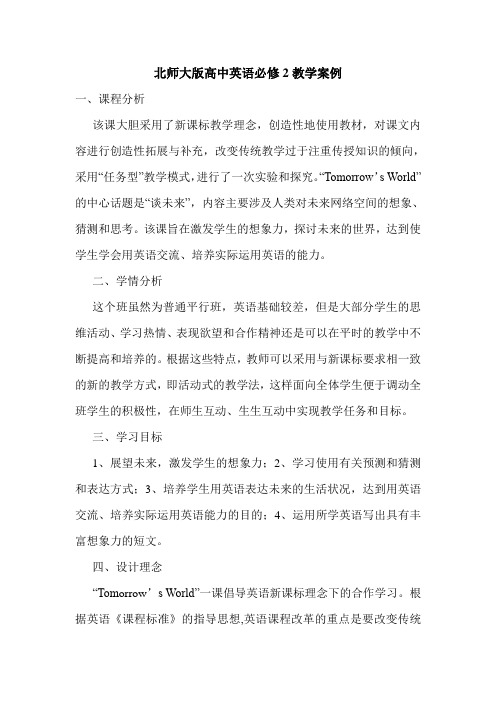
北师大版高中英语必修2教学案例一、课程分析该课大胆采用了新课标教学理念,创造性地使用教材,对课文内容进行创造性拓展与补充,改变传统教学过于注重传授知识的倾向,采用“任务型”教学模式,进行了一次实验和探究。
“Tomorrow’s World”的中心话题是“谈未来”,内容主要涉及人类对未来网络空间的想象、猜测和思考。
该课旨在激发学生的想象力,探讨未来的世界,达到使学生学会用英语交流、培养实际运用英语的能力。
二、学情分析这个班虽然为普通平行班,英语基础较差,但是大部分学生的思维活动、学习热情、表现欲望和合作精神还是可以在平时的教学中不断提高和培养的。
根据这些特点,教师可以采用与新课标要求相一致的新的教学方式,即活动式的教学法,这样面向全体学生便于调动全班学生的积极性,在师生互动、生生互动中实现教学任务和目标。
三、学习目标1、展望未来,激发学生的想象力;2、学习使用有关预测和猜测和表达方式;3、培养学生用英语表达未来的生活状况,达到用英语交流、培养实际运用英语能力的目的;4、运用所学英语写出具有丰富想象力的短文。
四、设计理念“Tom orrow’s World”一课倡导英语新课标理念下的合作学习。
根据英语《课程标准》的指导思想,英语课程改革的重点是要改变传统教学过分重视语法和词汇知识的讲解与传授、即忽视对学生实际语言运用能力的培养的倾向,强调课程从学生的学习兴趣和认知水平出发,倡导学生体验参与、合作与交流的学习方式和“任务型”的教学模式,由学生共同努力来实现教学目标。
教师要引导学生利用所学语言来完成任务,促进学生运用所学外语获取信息,处理信息,使用信息与人交流,让学生去发现问题、设计问题并解决问题,提高合作意识,培养合作精神,从而实现学生的主体地位,发展学生的综合语言运用能力。
五、教学媒体设计指导学生将信息技术与英语学习相整合,教师鼓励学生利用网络资源及多媒体技术积极探索和运用知识。
让学生展开想象,搜集有关资料,制成课件。
北师大版高中英语必修2 Unit4 Lesson 4 Virtual Tourism 教学设计案例
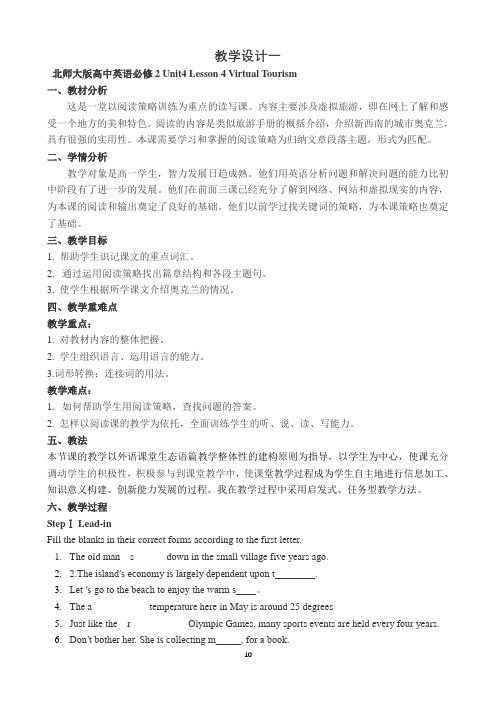
教学设计一北师大版高中英语必修2 Unit4 Lesson 4 Virtual Tourism一、教材分析这是一堂以阅读策略训练为重点的读写课。
内容主要涉及虚拟旅游,即在网上了解和感受一个地方的美和特色。
阅读的内容是类似旅游手册的概括介绍,介绍新西南的城市奥克兰,具有很强的实用性。
本课需要学习和掌握的阅读策略为归纳文章段落主题,形式为匹配。
二、学情分析教学对象是高一学生,智力发展日趋成熟。
他们用英语分析问题和解决问题的能力比初中阶段有了进一步的发展。
他们在前面三课已经充分了解到网络、网站和虚拟现实的内容,为本课的阅读和输出奠定了良好的基础。
他们以前学过找关键词的策略,为本课策略也奠定了基础。
三、教学目标1. 帮助学生识记课文的重点词汇。
2.通过运用阅读策略找出篇章结构和各段主题句。
3. 使学生根据所学课文介绍奥克兰的情况。
四、教学重难点教学重点:1. 对教材内容的整体把握。
2. 学生组织语言、运用语言的能力。
3.词形转换:连接词的用法。
教学难点:1.如何帮助学生用阅读策略,查找问题的答案。
2. 怎样以阅读课的教学为依托,全面训练学生的听、说、读、写能力。
五、教法本节课的教学以外语课堂生态语篇教学整体性的建构原则为指导,以学生为中心,使课充分调动学生的积极性,积极参与到课堂教学中,使课堂教学过程成为学生自主地进行信息加工、知识意义构建、创新能力发展的过程。
我在教学过程中采用启发式、任务型教学方法。
六、教学过程StepⅠ Lead-inFill the blanks in their correct forms according to the first letter.1.The old man s______ down in the small village five years ago.2. 2.The island′s economy is largely dependent upon t________.3.Let ′s go to the beach to enjoy the warm s____。
高中英语必修二全套教案(北师大版)
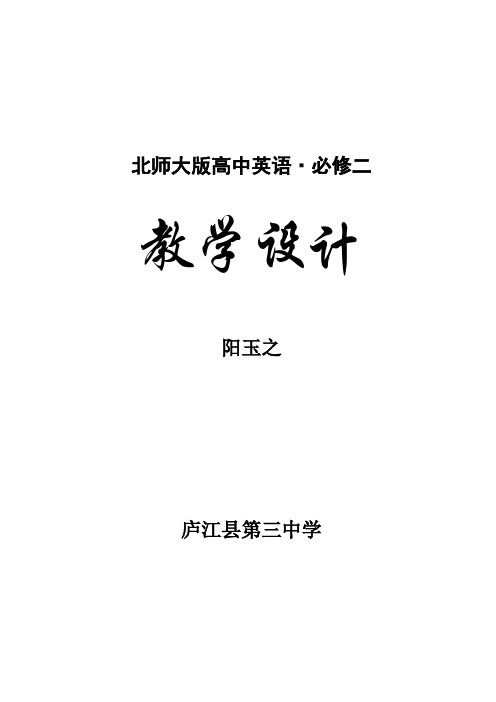
北师大版高中英语·必修二教学设计阳玉之庐江县第三中学Unit 4 L.1 Tomorrow`s WorldObjectives : (reading, speaking and debate)To practise getting the general idea while reading the text for the first time.To use the title of a text to predict the content.To develop strategies to match topics with paragraphs.To identify important words in a text.To debate on students` opinions of cyberspace. ( optimistic or pessimistic)To write an article about their opinions of cyberspace.ReadingStep 1 Warm-upAs a class, students answer the question "Compared to 10 years ago, how do you think the technology has changed our lives?"The teacher will give the example first to start students` thinking, e.g.Ten years ago our cellphones were big and only for calls but now they become smaller and multi-functional.Students would surely mention the computer. And the teacher then guides the students to the topic : The Future of Cyberspace.Step 2 PredictionAsk students how useful it is to read the title of a text or a newspaper headline. In pairs , students discuss which topic will be mentioned in this text. Ask students if they would be mentioned any other topics if they were writing the article.Step 3 Extensive reading and getting the general idea.Match topics with paragraphsStudents read the text on the screen quickly and check their guesses.( the time limit on the screen can train students` ability of fast reading and getting key words)Answers: the Internet virtual realityAt the same time students match topics with paragraphs.( exercises will be presented in the material.)Step 4 Words GuessingIn order to train students` ability of guessing meanings of new words, the teacher will ask students to read out the sentences in the text containing the key words and then substitute the definition in the sentence. ( more practice will be done in the homework paper.)Step 5 Intensive ReadingStudents read the text again, finding the details of optimistic opinions and pessimistic opinions.Step 6 DebateStudents debate on Cyberspace, using all information they have learnt before.Step 7 Homework and AssessmentStudents will write an article about their opinions of cyberspace. The teacher will evaluate what students have got from the class and students are requested to do aself-assessment.1.Multiple choices.(1).Match the paragraphs with these headings in one minute. (general ideas)A) Pessimistic opinionsB) Seeing the futureC) Optimistic opinionsD) The Internet growth(2).Read the text again and choose the best topic sentence for the passage. (main idea)A) The Internet is good for us.B) The pessimistic opinions about the cyberspaceC) The opinions about the Internet.D) How are the computer and the Net going to affect our lives.(3).According to Peter Anderson, where will we live in the future? (detail information)A) outer spaceB) virtual worldC) virtual houseD) Internet world2. Guess the definitions of the underlined words.(1).Some experts are pessimistic about the Future. One worry is crime in cyberspace.(2).Even now, young hackers can get into the computer of banks and governments.3. SummaryThe article talks about _____________.Different people have different ideas. Someare__________. They worry about the crime, hackers and terrorists in cyberspace. However,many people are__________. They think computer can make our life easier. People can buy books, ____ticket, etc. Some experts believe that we will live in ____________ in theFuture.4. Open questions.(1)Compared to 10 years ago, how do you think technology has changed our life?(2)What`s your opinion about the cyberspace? Are you pessimistic or optimistic about it? Why? (for debate)Self - assessment1. Do you know when and how to get the general idea? Yes ( ) No( )2. Do you know the structure of this passage? Yes ( ) No( )3. Are you confident to speak in the class? Yes ( ) No( )4. Are you interested in debate? Yes ( ) No( )5. What can you do when you come across new words ? Yes ( ) No( )6. Did you ever make any guessing before you read the passages? Yes ( ) No( )7. Do you like this lesson? Yes ( ) No( )8. What`s your suggestions to the teacher? Yes ( ) No( )Unit 4《Cyberspace》lesson2 WebsitesSenior High English Book 2Unit 4 Cyberspace Lesson 2 WebsitesⅠ. Preparations Before Class (课前准备)Task 1: Song Enjoying (好歌想听就听)Listen to the song and try to fill in the blanks with the words you hear.Hiding from the rain and snowTrying to forget but I won't let goLooking at a crowded streetListening to my own heart beatSo many people all around the worldTell me where do I find someone like you girlTake me to your heart take me to your soul (重复)Give me your hand before I'm oldShow me what love is - haven't got a clueShow me that wonders can be trueThey say nothing lasts foreverWe're only here todayLove is now or neverBring me far awayTake me to your heart take me to your soulGive me your hand and hold meShow me what love is - be my guiding starIt's easy take me to your heartStanding on a mountain highLooking at the moon through a clear blue skyI should go and see some friendsBut they don't really comprehendDon't need too much talking without saying anythingAll I need is someone who makes me wanna singTask 2: Make a Preparation (听前热身)1. The Pentagon (五角大楼)has sent the military to Iraq and the military action has been taken to deal with the fights there.2. Dr May is a great scientist. She has done a lot of scientific researches into the Internet. Today, she's going to tell us something about the history of the Internet.Predict: Did the Net begin for military reasons or for scientific reasons?Ⅱ. Activities in Class (课堂活动)Task 1: Rewarding time (比一比)Task 2: Have a try (牛刀小试) Tick the words you hear:Manchester University, Britain, Internet, military, America, Pentagon, communications,nuclear war, linking, network, share ideas, entertainmentTask 3. Imagine and listen (想一想,听一听) Can you fill in the blanks with the words you hear?In ____________, the Pentagon _____ ___________ ____ communications after a nuclear war. And in 1969 they thought of _________ computers into a network. And then people in universities all over the world began to use the network to__________________. They use it for work and ______________.the 1960s; were worried about; linking; share ideas; for fun Task4. Word learning (词汇学习)1. Do you think Mandy gave some advice / suggested something / made some suggestions to Lucy for the weekend activities?2. Did Lucy accept or reject her suggestions?3. Did they make any arrangements for their weekend?21.(天津卷1). He telephoned the travel agency to_______ three air tickets to London.A. orderB. arrangeC. takeD. book解析:book和tickets搭配,是"订票"的意思。
北师大版高中英语必修二教学案全套
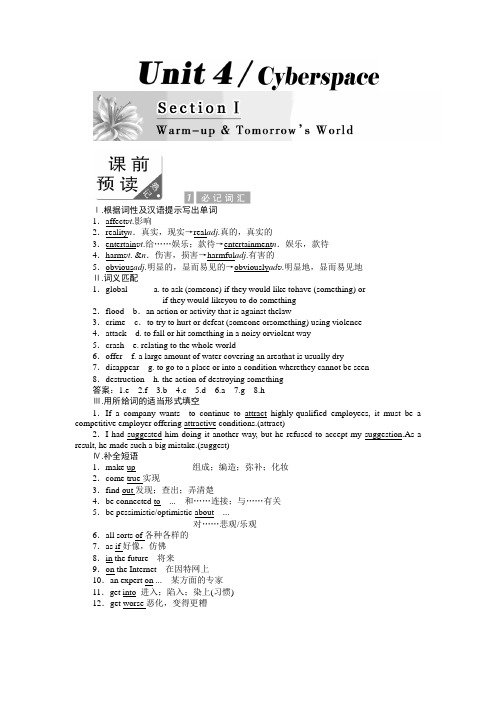
Ⅰ.根据词性及汉语提示写出单词1.affect v t.影响2.reality n.真实,现实→real adj.真的,真实的3.entertain v t.给……娱乐;款待→entertainment n.娱乐,款待4.harm v t. &n.伤害,损害→harmful adj.有害的5.obvious adj.明显的,显而易见的→obviously ad v.明显地,显而易见地Ⅱ.词义匹配1.global a. to ask (someone) if they would like tohave (something) orif they would likeyou to do something2.flood b.an action or activity that is against thelaw3.crime c.to try to hurt or defeat (someone orsomething) using violence4.attack d. to fall or hit something in a noisy orviolent way5.crash e. relating to the whole world6.offer f. a large amount of water covering an areathat is usually dry7.disappear g. to go to a place or into a condition wherethey cannot be seen8.destruction h. the action of destroying something答案:1.e 2.f 3.b 4.c 5.d 6.a7.g8.hⅢ.用所给词的适当形式填空1.If a company wants to continue to attract highly-qualified employees, it must be a competitive employer offering attractive conditions.(attract)2.I had suggested him doing it another way, but he refused to accept my suggestion.As a result, he made such a big mistake.(suggest)Ⅳ.补全短语1.make up组成;编造;弥补;化妆2.come true实现3.find out发现;查出;弄清楚4.be connected to ... 和……连接;与……有关5.be pessimistic/optimistic about ...对……悲观/乐观6.all sorts of各种各样的7.as if好像,仿佛8.in the future 将来9.on the Internet 在因特网上10.an expert on ... 某方面的专家11.get into 进入;陷入;染上(习惯)12.get worse恶化,变得更糟1.In the last thirty years, the Internet has grown rapidly.在过去的三十年里,网络已经迅速地发展起来。
北师大版高中英语必修第二册Lesson 1 A Sea Story
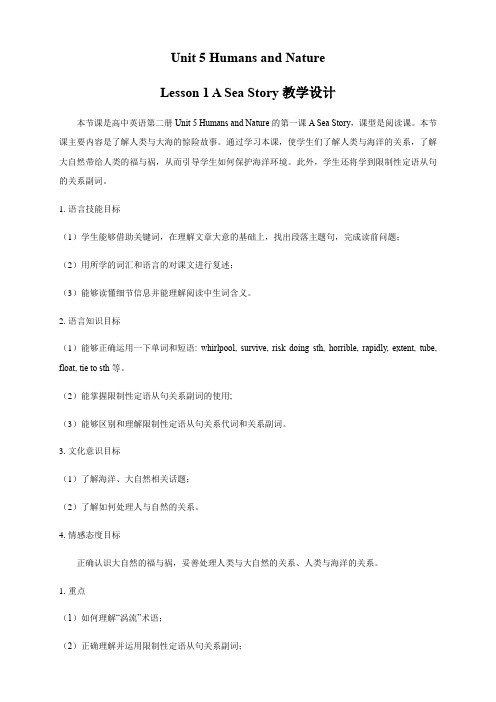
Unit 5 Humans and NatureLesson 1 A Sea Story教学设计本节课是高中英语第二册Unit 5 Humans and Nature的第一课A Sea Story,课型是阅读课。
本节课主要内容是了解人类与大海的惊险故事。
通过学习本课,使学生们了解人类与海洋的关系,了解大自然带给人类的福与祸,从而引导学生如何保护海洋环境。
此外,学生还将学到限制性定语从句的关系副词。
1.语言技能目标(1)学生能够借助关键词,在理解文章大意的基础上,找出段落主题句,完成读前问题;(2)用所学的词汇和语言的对课文进行复述;(3)能够读懂细节信息并能理解阅读中生词含义。
2.语言知识目标(1)能够正确运用一下单词和短语: whirlpool, survive, risk doing sth, horrible, rapidly, extent, tube, float, tie to sth等。
(2)能掌握限制性定语从句关系副词的使用;(3)能够区别和理解限制性定语从句关系代词和关系副词。
3.文化意识目标(1)了解海洋、大自然相关话题;(2)了解如何处理人与自然的关系。
4.情感态度目标正确认识大自然的福与祸,妥善处理人类与大自然的关系、人类与海洋的关系。
1.重点(1)如何理解“涡流”术语;(2)正确理解并运用限制性定语从句关系副词;(3)能够运用所学对“涡流whirlpool”进行介绍。
2. 难点(1)能用得体的用英语表述人与自然、海洋的关;(2)能正确掌握和使用限制性定语从句的关系副词;(3)能够区别关系代词和关系副词的不同。
北师大版高中英语必修二教案
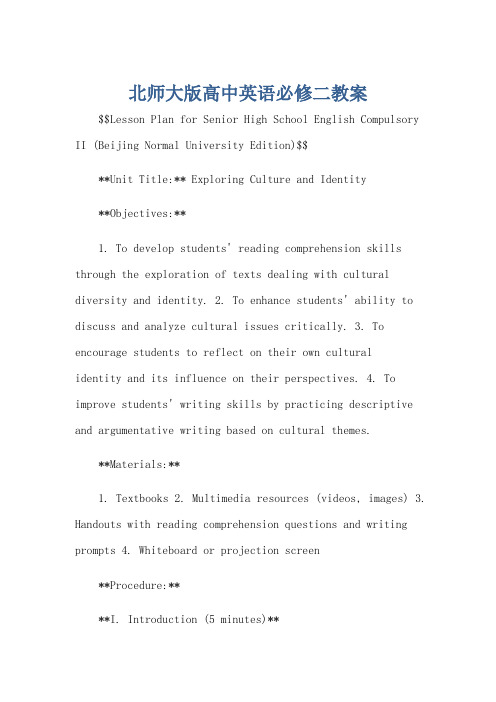
北师大版高中英语必修二教案$$Lesson Plan for Senior High School English Compulsory II (Beijing Normal University Edition)$$**Unit Title:** Exploring Culture and Identity**Objectives:**1. To develop students' reading comprehension skills through the exploration of texts dealing with cultural diversity and identity.2. To enhance students' ability to discuss and analyze cultural issues critically.3. To encourage students to reflect on their own culturalidentity and its influence on their perspectives. 4. To improve students' writing skills by practicing descriptive and argumentative writing based on cultural themes.**Materials:**1. Textbooks2. Multimedia resources (videos, images)3. Handouts with reading comprehension questions and writing prompts4. Whiteboard or projection screen**Procedure:****I. Introduction (5 minutes)**1. Begin the lesson by greeting students and asking them to brainstorm ideas about the concept of "culture" and "identity."2. Discuss their responses, emphasizing the diverse nature of cultures and how identity is shaped by cultural backgrounds.**II. Reading Comprehension (15 minutes)**1. Introduce the main text of the unit, focusing on a cultural issue or a story that explores identity.2. Ask students to read the text silently, noting down any unfamiliar vocabulary or phrases.3. Provide definitions or examples for the new vocabulary, and encourage students to guess meanings from context.4. Discuss the main points and themes of the text, asking students to identify key ideas and examples.5. Administer a reading comprehension quiz with multiple-choice or true/false questions to assess understanding.**III. Critical Analysis (10 minutes)**1. Divide students into small groups and ask them to discuss the following questions: - How does the text reflect the cultural norms and values of the society it portrays? - How do the characters' identities shapetheir experiences and perspectives? - What are the similarities and differences between the cultures described in the text and your own culture? 2. Each group presents their findings to the class, and a class discussion follows to explore different viewpoints.**IV. Multimedia Enhancement (5 minutes)**1. Show a video clip or a series of images that illustrate different cultural practices or traditions.2. Ask students to identify the cultural elements present in the multimedia material and discuss their significance.3. Connect the multimedia content to the reading text, highlighting common themes or contrasting perspectives.**V. Writing Activity (15 minutes)**1. Provide students with a writing prompt related to the cultural theme of the unit. For example: - Write a descriptive essay about a cultural event or festival you have attended. - Compose an argumentative essay discussing the importance of preserving cultural heritage.2. Students write individually, encouraged to use the language and ideas from the reading text as well as theirown observations and experiences. 3. Provide guidance on essay structure, language use, and effective argumentation. **VI. Conclusion and Homework (5 minutes)**1. Conclude the lesson by summarizing the main points covered and emphasizing the importance of understanding and respecting cultural diversity.2. Assign homework: ask students to revise and finalize their essays, ready for peer review or teacher feedback in the next class.**Evaluation:**1. Evaluate students' comprehension of the reading text through the reading comprehension quiz.2. Assess their participation in group discussions and their ability to analyze and discuss cultural issues critically.3. Grade their writing assignment based on content, organization, language use, and the effectiveness of their arguments.**Reflection:**After the lesson, teachers should reflect on the effectiveness of the activities and whether students were engaged and challenged appropriately. Considerations for future lessons could include incorporating more interactiveactivities, providing more scaffolding for writing tasks, or exploring different cultural topics to maintain student interest.。
高中英语北师大版必修2 《Lesson4 Virtual Tourism》省级名师优质课教案比赛获奖教案示范课教案公开课教案
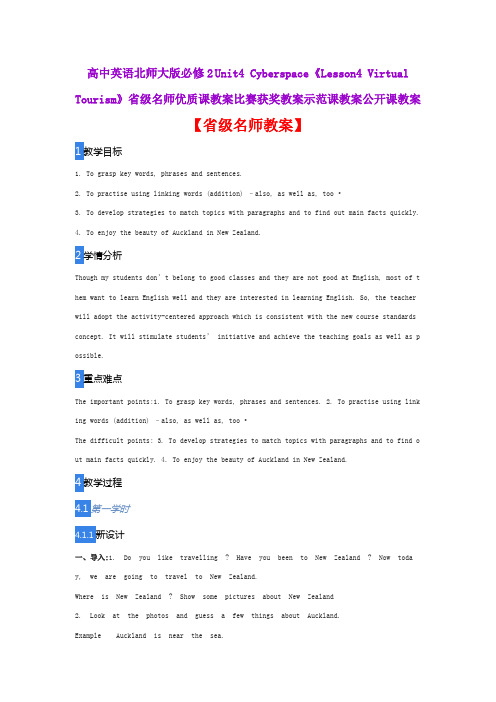
高中英语北师大版必修2Unit4 Cyberspace《Lesson4 Virtual Tourism》省级名师优质课教案比赛获奖教案示范课教案公开课教案【省级名师教案】1教学目标1. To grasp key words, phrases and sentences.2. To practise using linking words (addition) –also, as well as, too •3. To develop strategies to match topics with paragraphs and to find out main facts quickly.4. To enjoy the beauty of Auckland in New Zealand.2学情分析Though my students don’t belong to good classes and they are not good at English, most of t hem want to learn English well and they are interested in learning English. So, the teacher will adopt the activity-centered approach which is consistent with the new course standards concept. It will stimulate students’ initiative and achieve the teaching goals as well as p ossible.3重点难点The important points:1. To grasp key words, phrases and sentences. 2. To practise using link ing words (addition) –also, as well as, too •The difficult points: 3. To develop strategies to match topics with paragraphs and to find o ut main facts quickly. 4. To enjoy the beauty of Auckland in New Zealand.4教学过程4.1第一学时新设计一、导入:1. Do you like travelling ? Have you been to New Zealand ? Now toda y, we are going to travel to New Zealand.Where is New Zealand ? Show some pictures about New Zealand2. Look at the photos and guess a few things about Auckland.Example Auckland is near the sea.。
高中英语(Cyberspace)教案2 北师大版必修2 教案
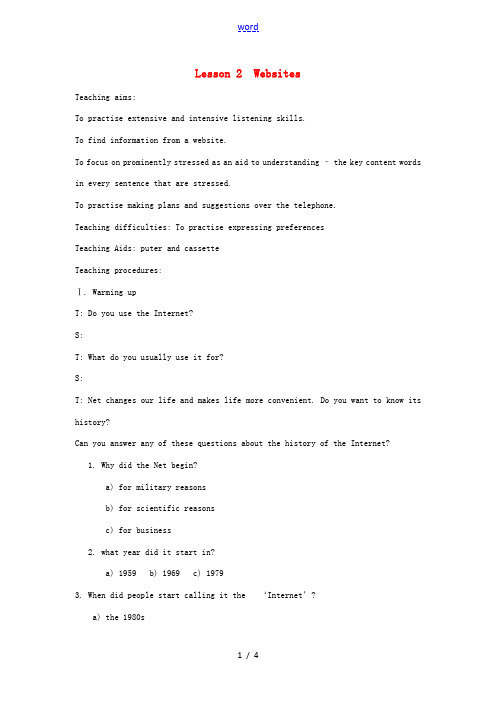
Lesson 2 WebsitesTeaching aims:To practise extensive and intensive listening skills.To find information from a website.To focus on prominently stressed as an aid to understanding –the key content words in every sentence that are stressed.To practise making plans and suggestions over the telephone.Teaching difficulties: To practise expressing preferencesTeaching Aids: puter and cassetteTeaching procedures:Ⅰ. Warming upT: Do you use the Internet?S:T: What do you usually use it for?S:T: Net changes our life and makes life more convenient. Do you want to know its history?Can you answer any of these questions about the history of the Internet?1. Why did the Net begin?a) for military reasonsb) for scientific reasonsc) for business2. what year did it start in?a) 1959 b) 1969 c) 19793. When did people start calling it the ‘Internet’?a) the 1980sb) the early 1990sc) the late 1990s4. When did the Internet start to grow very fast?a) the late 1980sb) the mid-1990sc) the late 1990sanswers: 1. a 2. b 3. a 4. bⅡ Listening and talkingListen to the tape and answer the questions.Listen again and answer the questionsWhy did the Net begin by the military?The Pentagon were worried about munication after a nuclear war. In 1969 they thought of linking puters into a network so that if one part of the network was destroyed , other parts could continue working.What do people use the network to do?People use the network to share ideas .They use it for entertainment, , playing games and getting information.Which ‘website’ can you visit to do these things?a) find out what’s going on in your townb) look for a jobc) find out the latest world newsd) get information for a school history projecte) write to your friend byf) buy clothesa3 b1 c6 d2 e5 f4 ask students to tell you the reason why you choose the answers.Listen to a telephone conversation between two people in Brighton. Which thing fromthe Internet page do they decide to do?Go to the cinema on Friday evening to see Richard Bailey’s new film, Virtual Planet Listen to the conversation again. plete the Function File with words and phrases from the list.See you, 973273, Would you like, hang on, are you up to, Do you fancy, I’d better, Why don’t we, I can’t, I’d love to , Sorry, Let’s, This is, pleaseAnswer the question Hello. (1) ______.Say who you are Hello, Mrs Turner. (2) ________ Mandy.Ask to speak to somebody Can I speak to Lucy, (3) ______?Ask somebody to wait Just (4) ________ a second.Ask about plans What (5) _______ _____ this weekend?Say you didn’t hear (6) _______?Make suggestions (7) _____________ go on Saturday morning? (8) ___________ doing something on Friday night? (9) ______________ to go?Reject suggestions Well, (10) _______. I’ve got a music lesson.Accept suggestions Great, (11) __________.Finish the cal Well, (12) _________ go now.Make an arrangement (13) _____ meet at 6:30, outside the cinema.Say goodbye Right. (14) _______ tomorrow.Answers: 1. 973273 2. This is 3. please 4. hang on 5. are you up to 6. Sorry 7. Why don’t we 8. Do you funcy 9. Would you like 10. Ican’t PronunciationListening Strategies: Important words•Listen for words that are stressed. They are important words.•Do not worry if you do not hear all the other words.Do the exercise 7Students listen to the seven sentences on the cassette. Pause after each sentencefor students to identify the stressed words.Then play the cassette for students to repeat the sentences. Ⅲ Homework。
北师大版高中英语必修2教学案例.doc

北师大版高中英语必修2教学案例一、课程分析该课大胆采用了新课标教学理念,创造性地使用教材,对课文内容进行创造性拓展与补充,改变传统教学过于注重传授知识的倾向,采用“任务型”教学模式,进行了一次实验和探究。
“Tomorrow’s World”的中心话题是“谈未来”,内容主要涉及人类对未来网络空间的想象、猜测和思考。
该课旨在激发学生的想象力,探讨未来的世界,达到使学生学会用英语交流、培养实际运用英语的能力。
二、学情分析这个班虽然为普通平行班,英语基础较差,但是大部分学生的思维活动、学习热情、表现欲望和合作精神还是可以在平时的教学中不断提高和培养的。
根据这些特点,教师可以采用与新课标要求相一致的新的教学方式,即活动式的教学法,这样面向全体学生便于调动全班学生的积极性,在师生互动、生生互动中实现教学任务和目标。
三、学习目标1、展望未来,激发学生的想象力;2、学习使用有关预测和猜测和表达方式;3、培养学生用英语表达未来的生活状况,达到用英语交流、培养实际运用英语能力的目的;4、运用所学英语写出具有丰富想象力的短文。
四、设计理念“Tom orrow’s World”一课倡导英语新课标理念下的合作学习。
根据英语《课程标准》的指导思想,英语课程改革的重点是要改变传统教学过分重视语法和词汇知识的讲解与传授、即忽视对学生实际语言运用能力的培养的倾向,强调课程从学生的学习兴趣和认知水平出发,倡导学生体验参与、合作与交流的学习方式和“任务型”的教学模式,由学生共同努力来实现教学目标。
教师要引导学生利用所学语言来完成任务,促进学生运用所学外语获取信息,处理信息,使用信息与人交流,让学生去发现问题、设计问题并解决问题,提高合作意识,培养合作精神,从而实现学生的主体地位,发展学生的综合语言运用能力。
五、教学媒体设计指导学生将信息技术与英语学习相整合,教师鼓励学生利用网络资源及多媒体技术积极探索和运用知识。
让学生展开想象,搜集有关资料,制成课件。
高中英语北师大版必修2《Lesson1 Tomorrow’s World》省级名师优质课教案比赛获奖教案示范课教案公开课教案
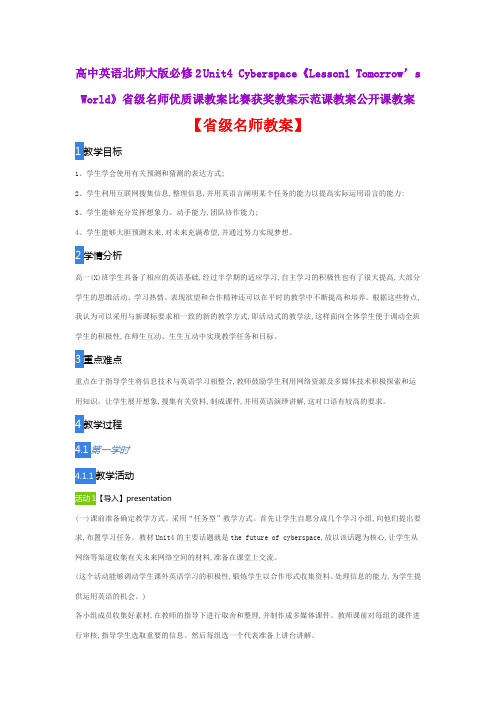
高中英语北师大版必修2Unit4 Cyberspace《Lesson1 Tomorrow’s World》省级名师优质课教案比赛获奖教案示范课教案公开课教案【省级名师教案】1教学目标1、学生学会使用有关预测和猜测的表达方式;2、学生利用互联网搜集信息,整理信息,并用英语言阐明某个任务的能力以提高实际运用语言的能力:3、学生能够充分发挥想象力、动手能力,团队协作能力;4、学生能够大胆预测未来,对未来充满希望,并通过努力实现梦想。
2学情分析高一(X)班学生具备了相应的英语基础,经过半学期的适应学习,自主学习的积极性也有了很大提高,大部分学生的思维活动、学习热情、表现欲望和合作精神还可以在平时的教学中不断提高和培养。
根据这些特点,我认为可以采用与新课标要求相一致的新的教学方式,即活动式的教学法,这样面向全体学生便于调动全班学生的积极性,在师生互动、生生互动中实现教学任务和目标。
3重点难点重点在于指导学生将信息技术与英语学习相整合,教师鼓励学生利用网络资源及多媒体技术积极探索和运用知识。
让学生展开想象,搜集有关资料,制成课件,并用英语演绎讲解,这对口语有较高的要求。
4教学过程4.1第一学时教学活动1【导入】presentation(一)课前准备确定教学方式。
采用“任务型”教学方式。
首先让学生自愿分成几个学习小组,向他们提出要求,布置学习任务。
教材Unit4的主要话题就是the future of cyberspace,故以该话题为核心,让学生从网络等渠道收集有关未来网络空间的材料,准备在课堂上交流。
(这个活动能够调动学生课外英语学习的积极性,锻炼学生以合作形式收集资料、处理信息的能力,为学生提供运用英语的机会。
)各小组成员收集好素材,在教师的指导下进行取舍和整理,并制作成多媒体课件。
教师课前对每组的课件进行审核,指导学生选取重要的信息。
然后每组选一个代表准备上讲台讲解。
- 1、下载文档前请自行甄别文档内容的完整性,平台不提供额外的编辑、内容补充、找答案等附加服务。
- 2、"仅部分预览"的文档,不可在线预览部分如存在完整性等问题,可反馈申请退款(可完整预览的文档不适用该条件!)。
- 3、如文档侵犯您的权益,请联系客服反馈,我们会尽快为您处理(人工客服工作时间:9:00-18:30)。
Unit4 Communication Workshop参考教案Teaching objective:To write sentences with the help of an internet pageTo listen to a song and extract important wordsTo listen to a radio programme for main factsResources used: cassette, slideTeaching difficulties: write sentences with the help of an internet page Teaching procedures:Ⅰ. Warming upAsk students what they already know abut Sydney—encourage them to say as much as possible.Then give them some information, such as:3. 9 million, Chinatown, Sydney Harbor Bridge, seaside city, surfing, Sydney Tower, official created a city. Fill the blanks with these informationⅡ WritingUse your notes to write key sentences for each paragraph about your area.For example:Sydney is a modern city located in South –eastern coast of Australia.The teacher gives students five minutes to do the exercise. Then ask students read out their sentences. After this, the teacher may show students these model sentences.1. It is known to all that Sydney Opera House has become a symbol of Sydney.2. Darling Harbor also attracts a lot of tourists as well.3. Sydney, official created a city, which has a population of 3.9 million was founded in 1788/1842.4. Sydney is a paradise of sailing, every year a great many come here for the sport.5. Sailing is not the only thing you can do in Sydney, which is also home to surfing, one of the most challenging sports.Ⅲ PracticePractise writing sentence describing a famous cityRio de Janeiro (里约热内卢)1. introduction:Population: A city where 11 million people /Brazil’s second largest city Located: west coast of the Atlantic Ocean2. Things to see:Entertainment: Carnival(狂欢节)Do not miss this great party /enjoy samba Places to visit: modern malls/ theme parks/Copacabana--princess of the Sea 3. Things to do:go swimming /go shopping/Copacabana beachwrite composition according to the informationⅣ Listening①Ask students what words they would expect in a song called “The TelephoneCall”②Students read the seven sentences and guess what the missing words mightbe③Play the tape for students to complete the sentences.Ⅴ Speaking①Students look at the pictures and discuss in pairs about the scientific experiments that have ever been done in space②Students read the questions and in pairs, guess what the answers are.③Listen to the tape and see whether your answers are right.Do the exercise stage 2 and stage 3Ⅵ HomeworkDo the exercise page 62Unit4 Lesson 1参考教案Tomorrow’s WorldTeaching objectives:To use the title of a text to predict the content.To practise using vocabulary of cyberspace.To practise using will and going to to talk and write about the future.Teaching difficulties: To revise Present Simple and Present Continuous.Teaching Aids: computer and cassetteTeaching procedures:Ⅰ. Warming upWhat computers and internet bring us?convenient, high efficientCompared to 20 years ago how do you think technology will change our lives?For example:Go shopping on line.Needn’t carry cash and use cre dit cards.Instead of going to the bank you can use a computer and a telephone to pay for bills.1. Imagine what happens in the next twenty years?2. Is it possible that the computer gives us disaster?Look at the title of the article.Which of these topics do you think it will mention?* the Internet * artificial human * time travel * robots * global warming * virtual reality Read the article quickly and check your guess to question 2 above.1.With the development of computers, our life may change in shopping andcommunicating ways2.The text infers to us that worry is not necessary and computers and the Internet onlydo good to us.3.Some experts say in the future we will not go to school in the classroom like us.4. In the future it is possible that people live in another world of outer space.5. The text tell us you can do many things but needn’t go to the place yourself.6. Because of the rapid development of Internet television and the mail will be replaced by computer.Keys: T F T F T TLearning vocabularyMatch the vocabulary from the text below with the definitions.hacker, chaos, terrorist, the Net (Internet), virtual reality, crash1. a person who enters other people’s computer programmes in secret2. The use of computers to make situations feel and look real.3. have an accident by violently hitting something.4. some who does terrible things to harm countries, governments and people.5. computer system that allows millions of people around the world to share information6. A terrible situation in which everything goes wrongKeys: 1. hacker 2. virtual reality 3. crash 4. terrorist 5. the Net (Internet) 6. chaos Correct error1.In the last thirty years, the Internet grew rapidly.2. Terrorist may “attack” the world’s computers, cause chaos, make planes and trains crash.3. It is convenient to order tickets from the internet.4. In 1983, there were only 200 computers connect to the Internet.5. It is clear we can use internet to do all kinds of things at home.6. Personally, I’m optimistic abo ut the future of internet.7. As society develops, computers will make our life much convenient.8. The mail service may also disappear as the increasing use of e-mail.Keys: 1. grew 改为has grown 2. make前加and 3. order 改为book 4. connect改为connected 5. clear后加that 6. of 后加the 7. much 改为more 8. as 改为with We can feel convenient, we can do all kinds of things from the Internet at home, such as buy books, find out about holiday offers, book tickets and so on.Some traditional things will disappear.We may live in a virtual world.Hacker can get into the computers of banks and government so that change data or steal away important information.Terrorists will attack the world’s computers, cause chaos, make planes and trains crash even and cause nuclear war.Voice your opinionDo you feel pessimistic or optimistic about the future of the Internet? Why?Language points1.In 1983, there were only 200 computers connected to the Internet.= which were connected to the Internet.computer 和connect 是被动关系,因此connected to 是过去分词做定语来修饰computer,相当于一个定语从句。
